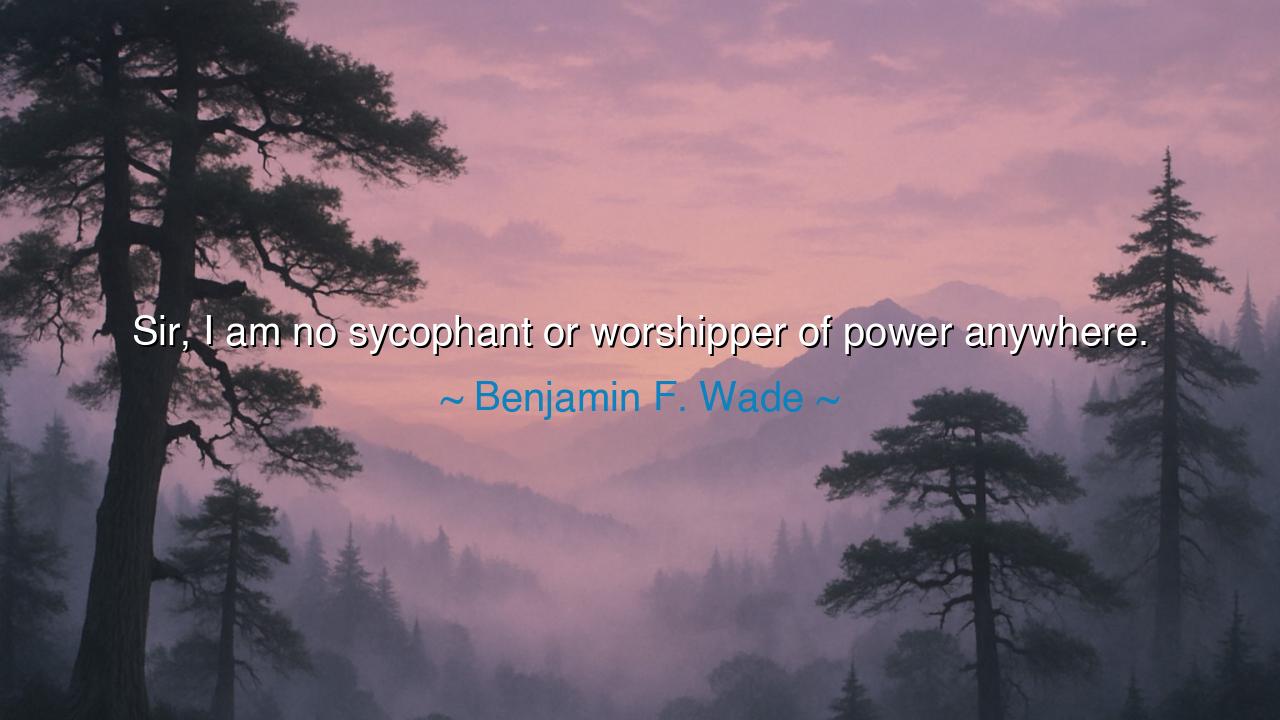
Sir, I am no sycophant or worshipper of power anywhere.






The fearless American statesman Benjamin F. Wade, a man of fiery conviction during the turbulent days of the Civil War and Reconstruction, once declared: “Sir, I am no sycophant or worshipper of power anywhere.” These words resound like the strike of a hammer against the chains of tyranny. In them, Wade rejects the cowardice of flattery and the corruption of blind obedience. A sycophant bends his knee to those in authority, not out of respect, but out of selfish ambition. Wade’s declaration is a vow of independence: that his voice, his principles, and his honor would never be for sale to the mighty.
To worship power is to give away the freedom of the soul. Those who idolize authority become tools of the powerful, losing their integrity for the sake of favor or protection. Such worship destroys nations, for it silences the truth and blinds rulers to justice. Wade’s words remind us that true strength lies not in serving the whims of the powerful, but in standing firm, even when surrounded by those who bow and scrape for rewards. It is a call to courage in the face of towering authority.
History offers a shining example in the life of Marcus Tullius Cicero, the Roman statesman and orator. In an age when many senators were corrupted by bribes and fear of Julius Caesar’s rising dominance, Cicero dared to speak against tyranny. Like Wade, he refused to become a sycophant, choosing instead to defend the Republic, even at the cost of his life. His defiance inspired generations, proving that a single voice raised in truth is stronger than a chorus of flattering lies.
Wade himself lived these words during one of America’s darkest hours. As a Radical Republican, he demanded the abolition of slavery and fought fiercely for the rights of freedmen. Many in government sought compromise or silence to preserve their positions, but Wade would not bend. Even when opposing President Andrew Johnson during the impeachment trial, he did so not out of lust for power, but out of devotion to justice. His life embodied his declaration: a refusal to worship power no matter where it appeared.
Let this teaching be carried forward through the generations: beware the path of the sycophant, for it leads to the death of nations and the corruption of souls. Speak truth to those in power, even when it is dangerous, for silence is a form of worship. As Benjamin F. Wade proclaimed, honor lies not in flattery, but in fearless independence. To stand upright amidst a crowd of bowing heads is the duty of every free and noble spirit, and in that defiance, true liberty is preserved.






TLPhan Mai Thanh Lam
I wonder if Benjamin F. Wade’s rejection of sycophancy is a criticism of the political and social systems of his time, or if it’s a more universal statement about human nature. Do we, as a society, naturally gravitate toward power because we’re wired to do so? Or do we choose to worship authority for the benefits it might bring? I find myself conflicted on whether this quote is a call for moral integrity or a reminder of the harsh realities of life.
GDGold D.dragon
Benjamin F. Wade’s declaration about rejecting sycophancy speaks volumes about the struggle for authenticity in an era dominated by power structures. It makes me wonder, how much of what we do in life is dictated by a subtle form of sycophancy? Are we really ever free of it, or does it manifest in ways that we don’t even recognize? Is it even possible to escape the influence of power when it pervades every aspect of our lives?
TMNgo Tra My
What intrigues me about this quote is its boldness. To openly reject the idea of sycophancy is a statement of strength. But, does this stance risk alienating you from others who may see this as an affront to power or leadership? In a world where power often dictates social mobility, can we truly afford to reject sycophantic behavior, or are we forced to play along to survive? Does the quote reflect idealism or practicality?
TNThuyanh Nguyen
Benjamin F. Wade’s quote strikes me as a powerful reminder of personal integrity and resistance against manipulation, but it also raises the question: is it naive to think we can live without any form of sycophantic behavior? In the corporate world, for example, would rejecting all forms of power worship limit your career growth or social influence? Can we truly live without engaging with those in positions of power, or is it a necessary evil?
KTKhanh Tran
I find myself questioning whether it's even realistic to be completely free of sycophancy in modern life. Is it even possible to avoid being caught up in systems of power, whether in work, politics, or personal relationships? Benjamin F. Wade's bold rejection of power structures might inspire some, but in practice, how much do we conform or even compromise our values just to get by? It's a tough dilemma.